#financial phenomenon
Text
Power of Compounding: A Complete Guide
Introduction
The power of compounding is a financial phenomenon that showcases the remarkable ability of money to multiply over time, creating a snowball effect that can lead to substantial wealth accumulation. At its core, compounding involves earning not only on the initial investment but also on the accumulated interest or returns from previous periods. This compounding effect accelerates…
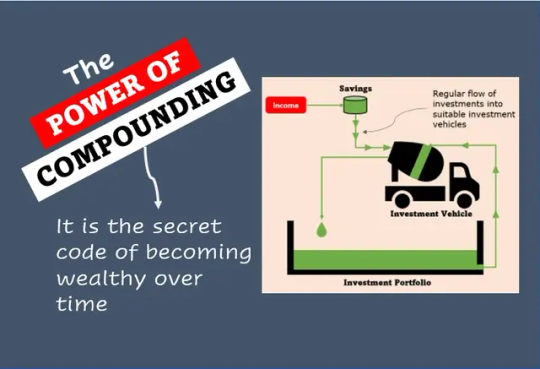
View On WordPress
0 notes
Text
look i understand that ai generated content is a controversial topic, and ultimately protecting artists' intellectual property should take moral priority, but i feel like when people say "you don't want character.ai you want to rp with someone" they're kinda missing the point because unlike a chatbot, you can't exactly look your rp partner in the eye and say "that sucked ass. do that again"
#i mean you can but you won't have an rp partner by the end of it!!!#like there's a very specific perk that's being catered to here by removing human interaction#and that is. compromising and cordiality#although i do agree with the general sentiment behind those posts. as in these technologies ARE taking advantage of a very real phenomenon#where people are becoming increasingly lonely and antisocial and afraid of vulnerability in peer-to-peer interaction#anyway if you want some really good opinion pieces on this go read ted chiang's essays on ai for the new yorker#and also the interview he did for the financial times
226 notes
·
View notes
Text
***
#this is gonna sound so obnoxious but please stick with me here#it’s been interesting to see my bootstrap believing parents come to terms with the difference between my brother and I#I am so incredibly fortunate/privileged it’s kind of insane#my fiancé is an accountant with a generous family and I’m a lawyer#I think our life is like. the bare minimum of what every human should have just by virtue of being alive#we have decent housing and can afford groceries and modest vacations and have health insurance etc#my family is lower to true middle class depending on the year#and my brother is a broke single grad student in a creative field#but I’m the oldest so my parents will be like ‘well idk why his apartment is so expensive that seems like a poor choice’#and then I tell them what our rent is (and we got a deal because the previous tenants trashed the place)#and they’re like 👀👀👀 pardon#like yeah that’s the housing crisis. idk what to tell you. housing is too expensive#I can’t quite articulate the phenomenon but it’s like me being the prototype of ‘successful’#and then living a modest life fairly similar to my parents when they were my age and decidedly not lawyers is actually clicking for them#like maybe things are actually super broken. and poverty/financial stress has nothing to do with work ethic and everything to do with luck
3 notes
·
View notes
Text
Yeah I really have no patience for self-important people who desperately want to inject themselves into creative industries just because they consider "enjoying media" their defining trait that somehow other people don't have. Being a dedicated fan is a great thing for sure, but you become self-absorbed when you think that, alone, is why you deserve to cut out a hole for yourself in the industry and not maybe the fact that you've put in the work to hone industry-specific skills.
Creative fields are not easy money or easy clout or whatever. Believing so is such a disrespect to those skills and everyone who's worked so hard to get where they are.
#Stupid shit#Vent#Don't mind me just get really angry when I see the adult versions of the 'my uncle works at nintendo' types#A phenomenon most people grow out of after entering high school#It's so fucking embarrassing seeing full grown adults acting so childishly just so they can inject themselves out of selfishness.#This also applies to people who claim to actually work a creative field but have absolutely nothing to show for it#Oh you're a graphic designer? You're an animator? A producer? Where's your portfolio? Any posts with your work?#Any proof at all that you actually study and work at honing this creative skill????#Any history of participating in projects and contributing??? Even just financially??#ANY EVIDENCE OF ANY CREATIVE INPUT YOUVE EVER GIVEN?? EVER????#no? You just wanna run your mouth under the guise of having authority on a subject you have literally no experience in???#That's what I thought.#Be fucking wary of these people and don't fucking buy everything they say because they're gonna invent whatever lie gets them attention
12 notes
·
View notes
Text
Unraveling the Consequences of Virtual Celebrity: The Price of Internet Fame
In TSDS 276, El Uno and TraB unravel the complex world of internet fame—a burgeoning phenomenon where individuals amass popularity and recognition through various online platforms. However, as the transcript reveals, this realm of virtual stardom is not without its own set of far-reaching consequences and profound challenges.
Chief among the consequences is the unrelenting pressure to…
View On WordPress
#Caution#Challenges#Consequences#Criticism#Distinction#Distorted reality#Financial decisions#Image#Influencers#Internet fame#Judgment#Mindfulness#Online persona#Online presence#Perception#Persona#Personal lives#Phenomenon#Popularity#pressure#Prudence#Public image#Public scrutiny#Recklessness#Recognition#Relationships#Responsibility#Validation#Virtual presence
0 notes
Text
How To Talk About Given As A Piece On Housing Precarity And Poverty And Not Sound Like A Mad Person
#institutionalize me if you will. there’s so much interesting stuff going on in akihiko’s storyline that I think is well-done#except for the total tonal dissonance with the first arc and the fact that It Is Like That#a story about a person with limited income who becomes dependent on an unhealthy relationship for financial and housing security#slash a story about a homeless person who doesn’t fit the idea of homelessness is something you do not see a lot.#it’s a common phenomenon in the world very rarely explored in fiction#and you wouldn’t expect the Edgy arc of a romance series to go into as much detail as it does with that economic reality#now if only it didn’t have the fuckin whiplash of cutting to the rest of the series#to clarify I like the arc in isolation but the way it’s done as a romance skeeves me out#kelsey liveblogs manga
1 note
·
View note
Text
I saw a slideshow about which states in the U.S. allow child marriage and the comments were like “Yes but that’s with parental permission.” as though that somehow makes it better. The institution of child marriage throughout history has generally been precipitated by parents selling their children for higher social standing, financial gain or simply because they no longer want to be responsible for them. It was not a phenomenon caused by loved children being stolen off the street in broad daylight.
As someone from a rural area in the south, almost everyone has at least one female family member who was a child bride. Usually the story is that girl’s parents said “You’re 14, that 30 year old who is perversely interested in you has a good job and will be a good provider. We approve of you marrying him because we can’t be arsed to care about you and a woman’s worth is only as a mother and wife.”
This is still happening to this day in fundamentalist religious communities through the U.S. where a girl’s worth is often based on how chaste and ‘innocent’ she seems, older women seen as more worldly and impure by virtue of being more wise. So many fundies get married at 17, 18, 19 or 20 and their parents would probably marry them off at a younger age if they could. And sometimes they still do.
#child abuse#child exploitation#child marriage#it’s often the same thing with trafficking scenarios#misogyny
1K notes
·
View notes
Text
'Why creatives are seeking residuals' - thread by Stefanie Williams
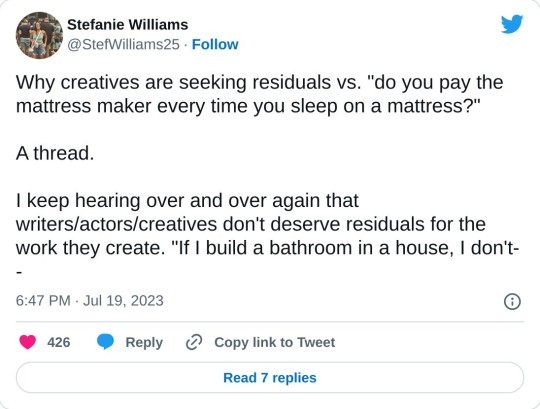

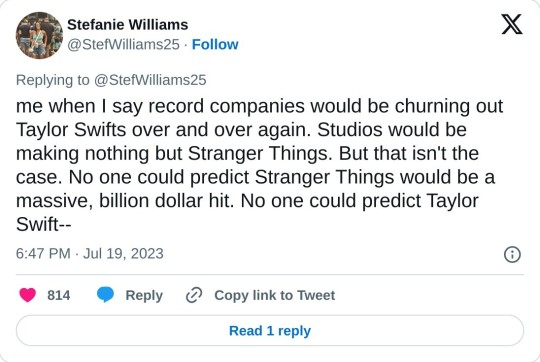
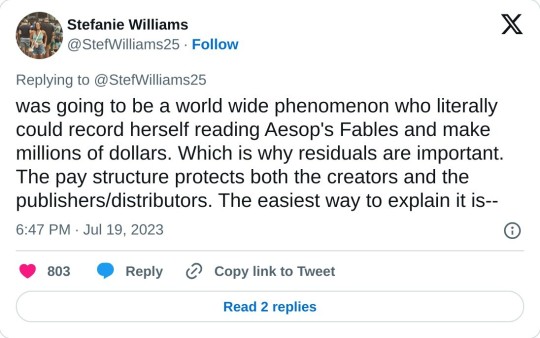




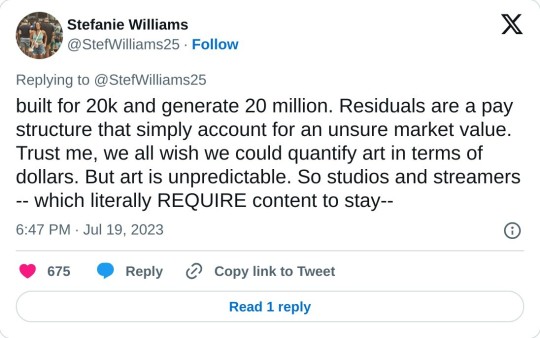
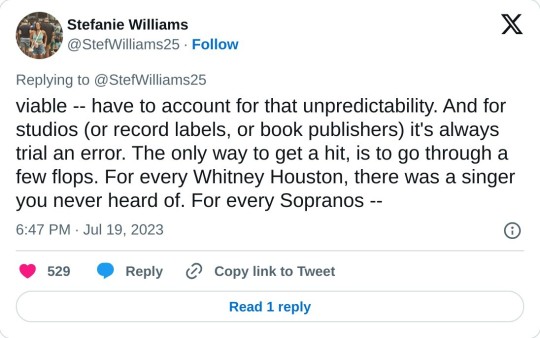
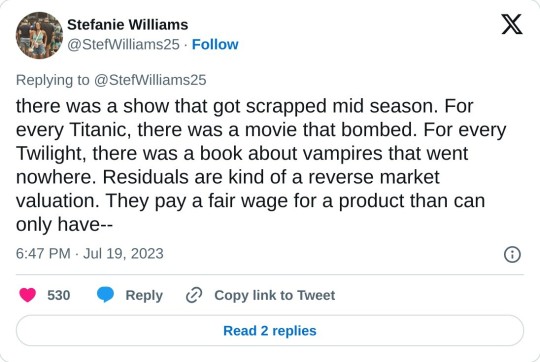
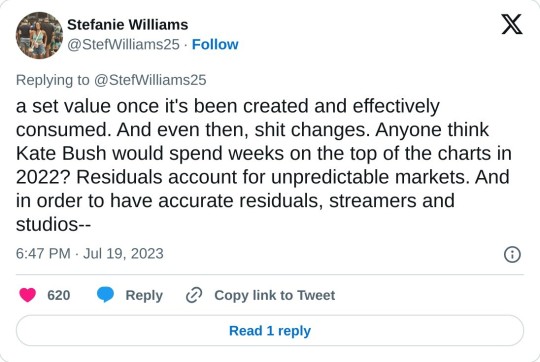
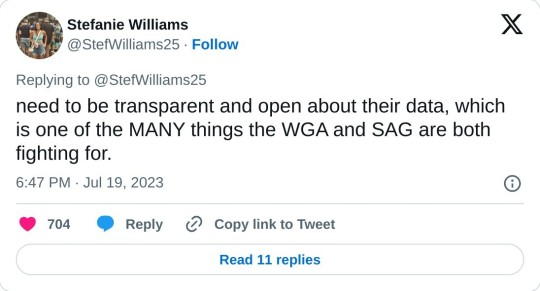
[Tweet thread by Stefanie Williams @/StefWilliams25
TRANSCRIPT:
Why creatives are seeking residuals vs. "do you pay the mattress maker every time you sleep on a mattress?" A thread. I keep hearing over and over again that writers/actors/creatives don't deserve residuals for the work they create. "If I build a bathroom in a house, I don't get paid every time someone uses the toilet."
TRUE! However, your bathroom build has a set market value. Art does not. No one knows what makes one TV show an overnight success, and another a flop. No one knows what makes one song a hit, and the other a dud. If they did, trust me when I say record companies would be churning out Taylor Swifts over and over again. Studios would be making nothing but Stranger Things.
But that isn't the case. No one could predict Stranger Things would be a massive, billion dollar hit. No one could predict Taylor Swift was going to be a world wide phenomenon who literally could record herself reading Aesop's Fables and make millions of dollars. Which is why residuals are important. The pay structure protects both the creators and the publishers/distributors.
The easiest way to explain it is by referencing an author writing a book. Sure, an author might get a very modest up front fee, but the author is banking on royalties to really make money on the book — for every book sold, the author gets a piece of the pie. This protects both the author and the publisher—because if the book is a flop, the publisher doesn't go broke on a financial promise they made to the author that didn't pan out, and if the book is a mega-hit, the author didn't give away a massive, million-dollar book for 20k.
It's a sliding scale that is required for a product that has no set market value. What makes an actor's work on a hit show more valuable than an actor's work on a show that gets canned after five episodes? The market value for art almost always comes after the fact, so residuals account for that reality. They make sure the creator get compensated at a fair market rate. A person who builds a bathroom knows, upfront, what the market rate for a bathroom is. That bathroom won't suddenly be worth 1000 times more than you built it for in six months. It doesn't have the potential to be built for 20k and generate 20 million.
Residuals are a pay structure that simply account for an unsure market value. Trust me, we all wish we could quantify art in terms of dollars. But art is unpredictable. So studios and streamers -- which literally REQUIRE content to stay viable -- have to account for that unpredictability. And for studios (or record labels, or book publishers) it's always trial and error. The only way to get a hit, is to go through a few flops.
For every Whitney Houston, there was a singer you never heard of. For every Sopranos, there was a show that got scrapped mid season. For every Titanic, there was a movie that bombed. For every Twilight, there was a book about vampires that went nowhere. Residuals are kind of a reverse market valuation. They pay a fair wage for a product than can only have a set value once it's been created and effectively consumed.
And even then, shit changes. Anyone think Kate Bush would spend weeks on the top of the charts in 2022? Residuals account for unpredictable markets. And in order to have accurate residuals, streamers and studios need to be transparent and open about their data, which is one of the MANY things the WGA and SAG are both fighting for.
#sag-aftra strike#sag strike#actors strike#union solidarity#support unions#fans4wga#described#wga strike#writers strike
3K notes
·
View notes
Text
How the kleptocrats and oligarchs hunt civil society groups to the ends of the Earth

It's a great time to be an oligarch! If you have accumulated a great fortune and wish to put whatever great crime lies behind it behind you, there is an army of fixers, lickspittles, thugs, reputation-launderers, procurers, henchmen, and other enablers who have turnkey solutions for laundering your reputation and keeping the unwashed from building a guillotine outside the gates of your compound.
The field of International Relations has studied the enemies of the Klept in detail: the Transnational Activist Network is a well-documented phenomenon. But far more poorly understood is the Transnational Uncivil Society Network, who will polish any turd of sufficient wealth to a high, professional gloss.
These TUSNs are the subject of a new, timely scholarly paper by Alexander Cooley, John Heathershaw and Ricard Soares de Oliveira: "Transnational Uncivil Society Networks: kleptocracy’s global fightback against liberal activism," published in last month's European Journal of International Relations:
https://ora.ox.ac.uk/objects/uuid:5e5a3052-c693-4991-a7cc-bc2b47134467/download_file?file_format=application%2Fpdf&safe_filename=Cooley_et_al_2023_transnational_uncivil_society.pdf&type_of_work=Journal+article
The authors document how a collection of institutions – some coercive, others organized around good works – allow kleptocrats to take power, keep power, and use power. This includes "wealth managers, company providers, accounting firms, and international bankers" who create the complex financial structures that obscure the klept's wealth. It also includes "second citizenship managers and lawyers" that facilitate the klept's transnational nature, both to provide access to un-looted, prosperous places to visit, and boltholes to escape to in the face of coup or reform. It includes the real-estate brokers and other asset facilitators, who turn whole precincts of the world's greatest cities into empty safe-deposit boxes in the sky, while ensuring that footlose criminal elites always have a penthouse to perch in when they take a break from the desiccated husks they've drained dry back home.
Of course, it also includes the PR managers and philanthropic ventures that allow the klept to launder their reputation, to make themselves synonymous with good deeds rather than mass murder. Think here of how the Sacklers used charity to turn their family name into a synonym for culture and fine art, rather than death by opioid overdose:
https://pluralistic.net/2023/08/11/justice-delayed/#justice-redeemed
Beyond providing comfort to "Politically Exposed Persons" and "High Net-Worth Individuals," TUSNs are concerned with neutralizing TANs. Activists in these transnational networks play an inside-outside game: in-country activists will recruit peers abroad to bring attention to the crimes of their local kleptocrats. These overseas partners target the klept in the places they go to play and spend, spoiling their fun – and if they succeed in getting corrupt leaders censured abroad, then in-country activists can leverage that bad press to fight the klept at home.
To fight this "Boomerang Effect," TUSNs seek to burnish corrupt officials' reputations abroad, getting their names on humanitarian prizes, beloved sports teams, cultural institutions and great universities. They seek to capture international governance institutions that might wrong-foot kleptocrats, co-opting them to enable and even celebrate looters.
When it comes to elite philanthropy, TUSNs are necessarily selective. Kleptocrats' foundations don't fund anti-kleptocratic groups – they stick to "education, public health, the environment and the arts." These domains steer clear of human rights questions that might implicate their benefactors. Russian oligarchs love children's charities and disability rights – provided they don't target the Russian state.
If charitable giving is reputation laundering's carrot, then "reputation management" is the laundry's stick. Think of organized copyfraudsters who clone websites that have criticized their clients, then backdate the articles, then accuse the originals of infringing copyright in order to get them de-listed from Google or taken offline altogether:
https://pluralistic.net/2021/04/23/reputation-laundry/#dark-ops
Reputation managers also spend a lot of time in court. In the UK – the world's leader in libel tourism, thanks to a legal system designed to let posh monsters sue muckraking journalists into silence – Russian oligarchs have perfected the art of forcing their critics to shut up and go away:
https://pluralistic.net/2022/03/04/londongrad/#enablers
Indeed, London is a one-stop shop for the global klept, a place were forelock-tugging Renfields will buy you a Mayfair mansion under cover of a numbered company, sue your critics into silence, funnel your money into an anonymous Channel Islands account:
https://pluralistic.net/2022/01/07/the-klept/#pep
They'll sell you whole galleriesworth of "fine art" that you can have relocated to a climate-controlled container in a Swiss or Irish freeport:
https://pluralistic.net/2020/07/14/poesy-the-monster-slayer/#moneylab
They'll give your thick-as-pigshit progeny a PhD and never check to see whether he wrote his thesis himself:
https://en.wikipedia.org/wiki/LSE%E2%80%93Gaddafi_affair
Then they'll hook you up with a cyber-arms dealer to hunt your enemies by capturing their devices:
https://pluralistic.net/2021/07/27/gas-on-the-fire/#a-safe-place-for-dangerous-ideas
But don't let Brexit stop you from shopping for bargains on the continent. The Golden Passports of the EU – available in a variety of flavors, from Maltese to Cypriot to Portuguese – offer the discerning failson access to the luxury good shops and fleshpots of 27 advanced economies, making it a favorite of the Khmer Riche – the junior klept of Cambodia's ruling faction:
https://www.reuters.com/investigates/special-report/cambodia-hunsen-wealth/
But golden passports are for amateurs. Skilled klepts travel on diplomatic passports, which offer the twin benefits of free movement and consequence-free criminality, thanks to diplomatic immunity. The former Kazakh dictator's son-in-law enjoyed a freewheeling diplomatic life in Vienna; one daughters of the dictator of Tajikistan had a jolly time as an envoy to DC; another, to London (where else?).
All this globetrotting serves a second purpose: when rival elites seize power back home and force the old guard into exile, those ex-monsters can show up in the lands they called their second homes and apply for asylum. It turns out that even bomb-the-boats UK will welcome any asylum seeker who enters via the private jet terminal at City Airport (to be fair, these "refugees" have extensive properties in Zone 1 and country places in the Home Counties, so they won't need housing).
This stuff works. After Kazakh state goons murdered at least 14 protesters at a Zhanaozen oil facility in 2011, human rights groups around the world took up the cause. But they were effectively neutralized by TUSNs, with former UK PM Tony Blair writing on behalf of the Kazakh government to the EU condemning any kind of international investigation into the mass killings (add "former Prime Ministers" to the list of commodities for sale in the UK to sufficiently well-resourced murderer).
The authors close their paper with two case-studies. The first is of the daughters of Uzbek dictator Islam Karimov, Gulnara and Lola. And President Karimov was indeed a dictator: he trapped his population within his borders, forced them to use unconvertible scrip in place of money, and ordered the murder of hundreds of peaceful protesters, plunging the country into international isolation.
But while Uzbeks were sealed within their borders, Gulnara Karimov became an international player, running a complex network of businesses that mixed the products of the nation's oilfields with her family's fortune. She solicited – and received – bribes from Teliasonera, MTS and Vimpelcom, who were all vying for the contract to provide service in Uzbekistan. All told, she extracted more than $1b in bribes, laundering them through Latvia, Hong Kong and New York. She acquired real-estate in France and Switzerland, and her spree continued until her father collaborated with Uzbek security to seize her assets and place her under house-arrest.
Lola Karimova-Tillyaeva was Gulnara's estranged younger sister. She and her husband Timur Tillyaev ran the Dubai-based SecureTrade, which did extensive business with "opaque Scottish Limited Partnerships," laundering more than $127m in a single year to offshore accounts in the UAE and Switzerland. They acquired many luxe assets – a jet, a Californian villa, and an LA perfumier.
Lola styled herself as the face of the Karimovas abroad, a "philanthropist and cultural ambassador." She was a UNESCO ambassador and commissioned works of monumental art – and also sued the shit out of news outlets that reported factual matters about her family repressive activity at home. She organized AIDS charities in the name of Uzbekistan – even as her father was imprisoning a writer for publishing a book explaining how to have safer sex.
The second case-study is on Isabel dos Santos, "Africa's richest woman," daughter of Angolan dictator Jose Eduardo dos Santos. Isabel's vast fortune stemmed from her personal capture of vast swathes of the third-largest economy in Africa: "telecommunications, banking, diamonds, real estate and cement, among many others." Isabel enjoyed seemingly limitless access to state credit and co-investment, and was given first crack at newly deregulated industries. Foreign firms that invested in Angola were required to "partner" with Isabel's businesses.
Isabel claimed to be a "self-made woman" – a claim credulously parroted by the western press, including the FT. She used her homegrown fortune to become a major player abroad, especially in Portugal, where she was represented by the leading Portuguese law-firm PLMJ. Her enablers are who's who of corruption-loving lickspittles: McKinsey, Ernst and Young, Boston Consulting Group, and the Spanish BigLaw firm Uri Menendez.
Isabel cultivated a public facade of philanthropic giving and public spirited activism, serving as head of the Angolan Red Cross. She attended Davos and spoke at the LSE (she was also invited to Oxford, but her invitation was subsequently rescinded). On social media, she dismissed critics of her wealth and corruption as "colonialists," decrying their "racism" and "prejudice."
Isabel dos Santos's corrupt sources of wealth were finally, irrefutably exposed through the Luanda Leaks, in which the International Consortium of Investigative Journalists mapped the network of "top banks, management consultants and legal firms that were central to dos Santos’s operations."
Both case studies shed light on the network of brilliant, driven enablers and procurers without whom the world's greatest monsters would falter. It's a rare window on a secretive world, one that is poorly understood even by its inhabitants. As Michael Mechanic wrote in Jackpot, his 2021 book on vast, intergenerational fortunes, the winners of the lucky orifice lottery often lack any real understanding of how The Money is structured, grown and protected:
https://pluralistic.net/2021/04/13/public-interest-pharma/#affluenza
This point was reiterated by Abigail Disney, in a brave piece on what it's like to grow up subject to the oversight of these millionaires who babysit the children of billionaires:
https://pluralistic.net/2021/06/19/dynastic-wealth/#caste
This is an important contribution to the literature. We naturally focus on the ultrawealthy individuals whose reputations and fortunes are the subject of so much attention, but without the TUSNs, they would be largely helpless.

Going to Burning Man? Catch me on Tuesday at 2:40pm on the Center Camp Stage for a talk about enshittification and how to reverse it; on Wednesday at noon, I'm hosting Dr Patrick Ball at Liminal Labs (6:15/F) for a talk on using statistics to prove high-level culpability in the recruitment of child soldiers.
On September 6 at 7pm, I'll be hosting Naomi Klein at the LA Public Library for the launch of Doppelganger.
On September 12 at 7pm, I'll be at Toronto's Another Story Bookshop with my new book The Internet Con: How to Seize the Means of Computation.

If you'd like an essay-formatted version of this post to read or share, here's a link to it on pluralistic.net, my surveillance-free, ad-free, tracker-free blog:
https://pluralistic.net/2023/08/24/launderers-enforcers-bagmen/#procurers

Image:
Sam Valadi (modified)
https://www.flickr.com/photos/132084522@N05/17086570218/
CC BY 2.0:
https://creativecommons.org/licenses/by/2.0/
--
Colin (modified)
https://commons.wikimedia.org/wiki/File:Palace_of_Westminster_from_the_dome_on_Methodist_Central_Hall_(cropped).jpg
CC BY-SA 4.0
https://creativecommons.org/licenses/by-sa/4.0/deed.en
#international relations#ir#enablers#consiglieri#lickspittles#plutes#guillotine watch#politically exposed persons#peps#high net work individuals#hnwis#oligarchs#reputation laundering#spyware#renfields#big law#uk#kleptocrats#transnational activist networks#tans#civil society#ngos#transnational uncivil society networks#tusns#slapps#Uzbekistan#Gulnara Karimova#Isabel dos Santos#angola#corruption
2K notes
·
View notes
Note
Why do you think tumblr will die in only a few years?
Answer with jargon: a strong correlation between recent economic shifts and chaotic choices by major tech companies is most easily explained if the 'traditional' social media platforms of 2005-2020 are mostly a zero-interest rate phenomenon.
Longer answer, with less jargon: Even though Musk's takeover is making all the headlines recently, the last year has in fact seen major shakeups at many social media platforms, so Twitter is actually part of a trend. Almost inevitably, these are cases of social media companies trying to find a way to squeeze more money out of their userbase (Reddit), cut costs dramatically (Twitter), or both. This marks a sudden departure from a much more relaxed attitude towards revenue in the Pictures Of Cats industry, where the focus was historically more on expanding the userbase to a global scale and then counting on world domination to sort of <????> and then the company would become profitable eventually.
We joke, correctly, that Tumblr has never been profitable. But the entire structure of ad-supported content curation between human users is deeply suspect as a business model; IIRC Twitter was never profitable either, and Facebook has been juicing its numbers in very shenanigany ways. Discord was actually making money on net last I checked, at least a bit, so they're not all completely in the hole. But even if you take the accounting figures at face value, none of these companies has anything like the amount of money that their cultural prominence would suggest. Instead, they're heavily fueled by investment dollars, money given by super-rich people and institutions in the expectation that fueling the growth of the company now will pay off with interest later.
So what changed?
I'm not an expert here, but I'll do my best to muddle through. The American Federal Reserve has one mandate that dominates all others (sometimes called the 'dual mandate'), and one primary tool that it uses to enforce that mandate. The goal is to maintain low (but nonzero) rates of inflation and unemployment, which in their models are deeply interlinked phenomena. The tool is 'rate hikes', or more specifically, tweaking the mandatory rate of interest that banks charge one another when making loans.
As a particular consequence of this, hiking the rate also means that bonds start paying out much better. When the rate hike goes through, that affects people who let the government borrow their personal cash- that is, people who buy bonds- as well as institutions like banks that lend to one another. A rate hike means that you, personally, can make a little extra money by letting the government borrow it for a while. The federal government of the US is a rock-solid low-risk choice for this kind of moneymaking scheme, so the federal interest rate sort of defines the 'number to beat'; to attract investors, a company has to give those investors money at a better percentage than whatever the feds are offering. Particularly since a company is a lot more likely to go out of business than the state!
To wrap this back around to the Pictures Of Cats industry: the higher the rate hike, the better your company needs to be doing (or the less risky it needs to be as an option) to attract big investment dollars. Very high rates make it very hard to convince people to invest in business activity rather than the government itself, and very low rates put moonshots and big dreams on the table, investment-wise, in a way that wouldn't otherwise be possible. Social media companies were one of these big dreams.
In the great financial crisis of 2008, the Fed took the dramatic step of reducing their rate to zero, trying to juice the economy back to life. And ever since then, they've kept it there. This has produced an unprecedented amount of funding for very crazy stuff; it's part of what has allowed so many weird new tech companies (Uber, streaming services, etc.) to get so much money, so quickly, and use that to grow to massive size without a clear model of how they're ever going to make money. This state of affairs kept going for quite a while, with no clear stopping point; that zero-interest environment has been one of the shadowy forces in the background that shaped fundamental contours and limits in how our Very Online World has grown and developed. Until COVID.
Or rather, the bounce back from COVID: we suddenly saw a massive spike in inflation and an incredibly strong labor market, as employees quit in record numbers, negotiated higher salaries, and found better work, and at the same time supply chain issues and other economy stuff caused prices to climb dramatically. Recall the Fed's 'dual mandate', to control the employment rate and inflation. This was, basically, kicking them right in the jooblies. They responded in kind, finally finally raising their rates for the first time in 15 years. For some of the people reading this, it'll be the first significant shift in their entire adult lives.
The goal, as I understand it, is to fight inflation by reducing the amount of outside investment into private companies, forcing them to hire fewer people and pay smaller salaries, ultimately drawing money out of the working economy and driving prices back down by lowering demand for everything. You get paid less, so you eat out less, and buy at cheaper restaurants when you do, so restaurants have to compete harder by lowering their prices; seems pretty dodgy to me as a theory, but it's the theory. And the first part will almost certainly work- companies are going to see less investment.
For social media companies that are still paying most of their salaries with investor dollars instead of revenues, this is especially catastrophic. Without outside investment, they're just a massive pile of expenses waiting to happen, huge yearly costs in developer salaries and server fees. This is why, all of a sudden, every social media company is suddenly making bonkers decisions. They're noticing that nobody wants to give them any more money! So they're trying to figure out how to live a lot more cheaply, to actually somehow for reals turn their giant userbases in to some kind of actual revenue stream, or both.
Tumblr is kind of the ur-example of this kind of thing, supporting a very large userbase with no coherent plan whatsoever to start paying its staff with our dollars instead of investors' dollars. When interest rates were low and Scrooge McDuck had nowhere else to hide his pile of gold coins, a crazy kid with a dream was the best alternative available to him. But now, unless something changes, he's going to notice he can just buy bonds instead, and that crazy kid can go take a hike.
That's why I think Tumblr is living on borrowed time, though I don't know how much. Like all cartoons, the economy doesn't really fall off a cliff until somebody looks down and notices they've been standing on thin air this whole time. But they always fall eventually; that's the gag.
#I am not an economics#so if somebody wants to grade my accuracy here#that would be welcome#this is the situation as I understand it but my models are hazy
2K notes
·
View notes
Note
If YouTube shuts down in five years or if the channel stops doing well or if you just burn out or whatever, what’s your backup career? I feel like a lot of “content creators” become super specialized into doing content creation stuff
This question is interesting, because you've given voice to one of the anxieties it took me the longest to overcome.
My thesis on life is you can't live in any sort of healthy manner if you're constantly planning for the worst case scenario - what you would do if everything in your life suddenly changed. Like how you can't live comfortably anywhere if you've constantly planning for the next time you'll move out.
For me, that question takes the form "what if youtube suddenly exploded", but everyone has a scenario like that. In fact, everyone has an infinite number of scenarios like that.
What would I do for I living if I got sick or had an accident and could no longer meet the physical demands of my job?
What would I do if I had a breakdown and needed everything to stop?
What's my contingency plan for if my entire company exploded and I got laid off without warning?
What've I got lined up if a global pandemic shut down all in-person jobs?
What's my backup plan if I lost the sense I needed to create the art I specialize in?
What if my mind deteriorated and I could no longer engage with reality at all?
What if technological advancement replaced the need my job currently fills?
What'e my plan for if I lose someone I love and it breaks me?
What will I do if a natural disaster destroys my house?
Where will I live if a meteor hit the earth tomorrow?
The idea that "content creators" overspecialize ignores the fact that most people get very comfortable doing the thing they spend most of their time doing, and very rarely seriously plan for the scenario where their One Thing is ripped away from them and they have to find something else. The phenomenon of "person loses their job after years of work" is famous for being massively disruptive, and that isn't because everyone in the world is dumb or bad at planning ahead - it's because a disruption like that is a disruption, in the same way that an injury will always hurt. I don't think it's a failing for someone to live their life as it currently exists, just like it isn't a personal failing if someone experiences a catastrophic change and has to readjust. You can't solve a problem that doesn't exist yet, and if it does happen, it'll come with information and parameters that you'll need to actually deal with it rather than just worrying about it.
If youtube explodes, maybe I'd join our other youtube friends on another platform as we all worked to solve the same problem together. Maybe I'd be in a financial position where I wouldn't need an immediate fallback plan and could take uncomplicated time off. Maybe I'd pivot 100% to writing. Maybe I'd drop off the grid and live in the woods for a while. Maybe I'd get serious about pursuing voice acting or theater. Maybe a friend would recommend an opening at their normal person job. Since we're only pondering a hypothetical catastrophe, we can't predict any of the other factors that'd be in play that would actually determine how we'd handle it.
Most of us will experience many life-changing turning points, and in turn get to experience many different lives. I'm very much enjoying this one, but I'm not worried about what the next one might look like. Overplanning will spoil the adventure with needless anxiety - I'll just be excited to explore it whenever it comes.
607 notes
·
View notes
Text
Similarly, if gendered disrespect was the fundamental engine of domestic violence, we would expect to see much lower levels of it in same-sex relationships. But we don’t. Current Australian statistics suggest that rates of domestic violence are similar or slightly higher in same-sex relationships compared to heterosexual relationships. In factoring this out, you’d have to argue it’s a completely different, entirely parallel phenomenon that has nothing in common with heterosexual domestic violence, but which just so happens to occur with similar regularity and express itself in remarkably similar ways, running the now familiar gamut of coercive control, financial and emotional abuse and gaslighting. More plausible is that while there are some factors unique to same-sex and heterosexual cases respectively, their causes have much in common. An explanation that works only for one of them is unlikely to be much of an explanation at all.
253 notes
·
View notes
Text
i get people not being happy about the watcher move. i get people mourning that they can't afford to follow the guys rn. but actually wishing they would fail? hoping watcher employees are stressed and anxious? i don't think you actually like them, i think you just like having your whims catered to and you just see the guys as your funny little puppet friends.
i get that parasocial relationships are a...complex topic, particularly when a specific kind of content pretty much requires fostering that vibe. even when you know it's a real phenomenon, it's really easy to fall into the trap of, "these people are really cool/funny! i wish we were friends" (and tbf, i think a "friend crush" is still a *little* different bc i think most parasocial relationships make you think, "we ARE friends...or would be if we met.")
BUT. the flip side is forgetting that these guys are people, too. people who gotta make ends meet, particularly if they want to keep providing great content. people with families, bills, expenses, and yes even little treats. like, shit costs money and we can't accuse someone of greed or hope they fail and then pat ourselves on the back for being anti-capitalist or something. this move is a risk but also surely not an impulsive one, and the guys feel this is the right move both financially and creatively then you should hope they succeed!
and, ftr—i already signed up, and i've already sent out my login info to friends who aren't in a place rn to pay. support the guys if you can, but i think the bare minimum is not hoping they crash and burn.
#watcher entertainment#watchertv#ghost files#mystery files#puppet history#dish granted#shane madej#ryan bergara#steven lim
355 notes
·
View notes
Note
hi, love your blog! have you heard of "maga communism"? i personally find it pretty silly, but it does open up some questions and conversations about reactionary/conservative beliefs within communist movements and individual communists (can you call a reactionary a communist?). most "maga communist" and similar tendencies i have seen were pretty exclusively on twitter so far, for example individual self-described communists being homophobic (talking about "bourgeois decadence" and all that, you know the story), but its also rather concerning considering the recent transphobic course of the CPGB, or the homophobic statements of the KKE. how to deal with such tendencies in the movement? are such tendencies compatible with communist thought? (i personally dont think so, but how do you change such tendencies?)
would love to hear your thoughts on that!
MAGA communism is a US-specific subset of "patriotic socialism", patsoc for short. MAGA communism in particular peddles republican and other reactionary positions via pseudo-communist rhetoric. This isn't something new, almost if not all factions of the bourgeois political establishment use workerist rhetoric to some degree, such is their function to mislead the working class. The only thing that stands out to me from this sect is the outright self-labelling of being communists. Take even a shallow step into their positions however, and you'll find run-of-the-mill reactionarism and nationalism.
This is a very different phenomenon from actual communists taking some reactionary positions but who are otherwise quite "normal", and from actual socialist countries fostering some kind of patriotism.
Regarding the latter, the example I'm most familiar with is Cuba. Following their triumph in both national liberation from colonialism and the socialist revolution, one aspect of Cuba's strategy for security and that also was a natural rationalization of their victory was the proliferation of pride in the Cuban revolution. Critically, this form of pride is not like the usual (bourgeois, as in, the emergence of nationalism within the rise of capitalism) nationalism, but the expression of international solidarity with all peoples and honor in being one of the groups of workers who achieved self liberation. It's a pride of the Cuban revolution, not the Cuban nation in itself. There are no traces of superiority over other peoples in this kind of patriotism. This is categorically very different from what the patsoc types express.
"Normal" communists taking reactionary positions comes from a vestige of the capitalist culture that is hammered into every single one of us emerging because of an unfinished education in marxist philosophy. The solution to this is very simple, that is to continue the development of our mistaken comrade, and adequate punishment if those beliefs resulted in harm.
I also want to make dedicated points about the CPGB and the KKE. The CPGB, like most other historical Communist Parties in Western Europe, folded themselves into reformism within liberal democracy following the eurocommunist current that arose in the second half of the 20th century. The fact that the CPGB has adopted reactionary positions is a consequence of having embedded itself into parliamentarism, as the political consensus amongst bourgeois parties in the UK right now is that of transphobia and racism, they are following the same general shift that Labour has.
The KKE is a different story. I have talked to a (trans) militant of the KKE about this, as well as with another (cishet) militant. They say that the KKE's opposition to the introduction of homosexual marriage in the Greek parliament (which was thankfully passed) comes from a non-homophobic critique that was, however, badly communicated. The KKE has repeatedly proposed separating marriage itself from the legal and financial benefits that it carries. For example, instead of only being allowed to visit someone in a hospital if you're family or married, the KKE proposes that people should be able to authorize anyone to have these sorts of benefits without also having to marry them.
The voting against homosexual marriage was done on the grounds that the institution of marriage involves unnecessary state involvement in interpersonal relationships and abuse, since these benefits also sometimes lead to couples who can't afford to divorce. Was voting against gay marriage the best course of action? No, and the militants I've talked to agree. But it was never about the KKE believing that homosexuality is "bourgeois decadence", like some media outlets have twisted it, just like most ML Party positions are twisted in some way or another.
It also does not help that translations from Greek aren't that simple, and that can also lead to misinterpretation in subjects where nuanced language is very important, such as trans people. There are no separate words in Greek for "sex" and "gender", even though in English they are complicated terms with a lot of drawbacks, it is immensely useful to have separate words. So discussion in Greek about this, and more importantly translation, can very easily be misinterpreted or deliberately misconstrued.
I am not saying that the KKE is free from reactionary tendencies and that it's a paragon of absolute social progress, but just like it isn't that, it is also not comparable with crypto-fascists or glorified socdems playing into transphobic or racist tendencies. This leads me to a broader point about general reactionary thought in the past.
There is no doubt that people like Stalin or Lenin, or more appropriately the vast majority of ML parties in the past were homophobic (I'm using this term to also include transphobia and similar discriminations) and that they instituted policies that specifically hurt queer people. No serious communist today abides by those positions and those actions. And just like we can understand that an individual communist today may be insufficiently educated and express reactionary views and hurt people because of this, I think the analogy can be made that these past communist people and parties hadn't yet been sufficiently educated by practice and theoretical discussions. We can't ignore the harm that they did, but we can recognize that it was in no way necessary, and that it was counterproductive, so we can acknowledge those mistakes, carefully separate those elements from the rest of their achievements, and learn about them.
A good example of this evolution is Cuba. In the times of Che and Fidel, queer people were discriminated against and sometimes sentenced to forced labor, nobody denies this. But this was 50 years ago, and not only did Fidel recognize this mistake in this lifetime, he began the process of improving the party line on this which has resulted in one of, if not the most progressive laws regarding homosexuality in the world, in the form of 2022's family code, which you can read here in Spanish. I have copied part of article 4 below, which regulates the rights of people within a family, along with my own translation just below:
Artículo 4. Derechos de las personas en el ámbito familiar.
a) Constituir una familia;
b) la vida familiar;
c) la igualdad plena en materia filiatoria;
d) que se respete el libre desarrollo de la personalidad, la intimidad y el proyecto de vida personal y familiar;
e) que las niñas, los niños y adolescentes crezcan en un entorno familiar de felicidad, amor y comprensión;
f) la igualdad plena entre mujeres y hombres, a la distribución equitativa del tiempo destinado al trabajo doméstico y de cuidado entre todos los miembros de la familia, sin sobrecargas para ninguno de ellos, y a que se respete el derecho de las parejas a decidir si desean tener descendencia y el número y el momento para hacerlo, preservando, en todo caso, el derecho de las mujeres a decidir sobre sus cuerpos;
g) el desarrollo pleno de los derechos sexuales y reproductivos en el entorno familiar, independientemente de su sexo, género, orientación sexual e identidad de género, situación de discapacidad o cualquier otra circunstancia personal; incluido el derecho a la información científica sobre la sexualidad, la salud sexual y la planificación familiar, en todo caso, apropiados para su edad;
h) la protección a la maternidad y la paternidad y la promoción de su desarrollo responsable;
i) una vida familiar libre de discriminación y violencia en cualesquiera de sus manifestaciones;
j) una armónica y estrecha comunicación familiar entre las abuelas, abuelos, otros parientes, personas afectivamente cercanas y las niñas, los niños y adolescentes;
k) la autodeterminación, voluntades, deseos, preferencias, independencia y la igualdad de oportunidades en la vida familiar de las personas adultas mayores y aquellas en situación de discapacidad; y
l) al cuidado familiar desde el afecto.
And the translation (OC)
Article 4: A person's rights in the context of the family
a) To build a family;
b) to family life;
c) to full equality in filial matters;
d) for the free development of personality, intimacy, and the personal and familiar life project to be respected;
e) for the boys and girls and adolescents to mature in a familiar environment of happiness, love, and compassion;
f) the full equality between men and women, the egalitarian distribution of domestic work and care between all members of the family, without overburden to any of them, and for a couple's right to decide if they want descendants and the number and time to do so to be respected, preserving, in every case, the right for a woman to decide over her own body;
g) the full development of sexual and reproductive rights in the familiar environment, independently of their sex, gender, sexual orientation, and gender identity, disability, or any other personal circumstance; including the right to scientific information about sexuality, sexual health, and family planning, in every case, suitably for their age;
h) the protection of maternity and paternity and the promotion of its responsible progress;
i) a familiar life free of discrimination and violence in whichever of their manifestations;
j) a harmonious and close communication between grandmothers, grandfathers, other relatives, people who are affectionately close, and the girls, boys, and adolescents;
k) the self-determination, wills, desires, preferences, independence and equality of opportunity in the familiar life of adult people and those in a situation of disability; and
l) to affectionate familiar care.
164 notes
·
View notes
Text
The case against 'sharenting'
Yesterday, an Anon @bat-cat-reader got made me think. Long and hard, far and wide - research included.
Here is the Anon: https://www.tumblr.com/bat-cat-reader/750859423333908480/lo-bueno-de-estar-revisando-redes-constantemente?source=share . I wanted to piggyback first, then I realized the issue was way more important than the person in question. And decided to post everything separately.
Loved this very matter of fact, calm Anon and I totally agree with what was said about overexposing a child online.
This sudden surge of completely inappropriate information about that child raised an eyebrow, and then some more. It begs, as always when dealing with minors, the question of privacy, as opposed to using their image for what obviously is self-promotion. And more generally, what is called 'sharenting', a portmanteau combining 'sharing' (info) and 'parenting' that was quite recently invented by The Wall Street Journal to describe a more and more widespread phenomenon.
That some parents would just love to have and even share digital mementoes of their child(ren) is apparently ok. Others, however, choose to monetize their kids, turning them into a sales argument. I am still floored at such disingenuous choices, that might have serious consequences for their future. And I am not the only one, mind you: a 2018 report by England's Children Commissioner, the leading government official competent for protecting and promoting children's rights, found out that parental digital oversharing is a high risk behavior for the child.
Short term, as in identity theft ...


... to long term, as in lost academic or professional opportunities - the 2018 warning made only more compelling by the recent AI craze:
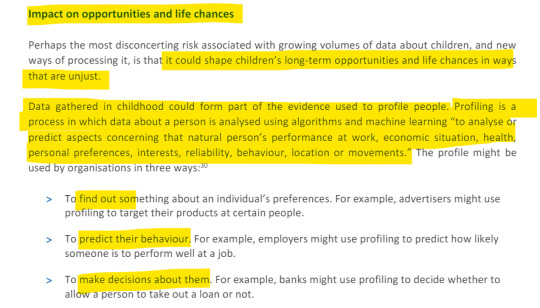
[Source: England's Children Commissioner Report 'Who Knows What About Me?', 2018 - online: https://assets.childrenscommissioner.gov.uk/wpuploads/2018/11/cco-who-knows-what-about-me.pdf]
You'll find this very recent article from The Guardian absolutely enlightening, too. I certainly did: https://www.theguardian.com/commentisfree/2024/feb/26/son-social-media-parents-children
Particularly this - I am not a mom, so Mordor bitches will certainly point this salient detail out, you see. But maybe this journalist mom's POV could give them (and maybe even other people) pause:
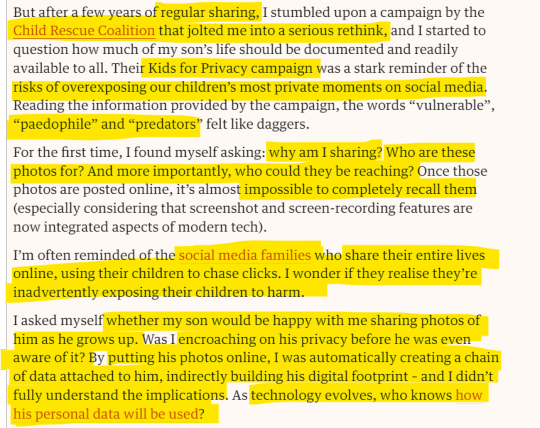
Pedophile. Quite chilling, right? Pedophile rings actively searching for children photos inadvertently being shared online, to feed sick obsessions worldwide (do not be parochial and think those pics must be of an ambiguous nature!). Instagram being currently in very hot water for its strange content promoting algorithm, allowing pedophiles to easily access children photos and personal data, based on exif. Digital kidnapping, as in criminals pretending to be the child's parents, for various financial or pathological reasons.
Think I am a stupid, stupid shipper with an agenda? Then so is the US House of Representatives Energy and Commerce Commission. Last year, a joint statement has been released by two if its members (and before Mordor starts screeching about 'the MAGA mommies obsession for pedophilia', let it be said it is a bipartisan, Democrat and Republican initiative), about the fact that 'Instagram hosts a vast network of pedophilic content and that its algorithms are actively driving users to this content':
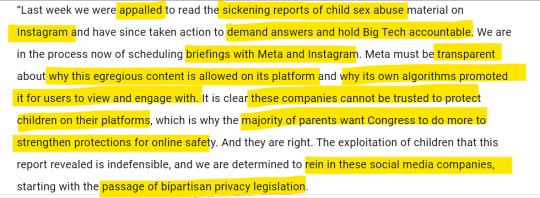
[Source: https://energycommerce.house.gov/posts/pallone-rodgers-demand-answers-from-instagram-after-reports-the-platform-is-driving-users-to-child-sex-abuse-material]
It followed a long report on Instagram's less than responsible practices in the matter, published by The Wall Street Journal, not your next door digital gossip rag (subscribers only, but you'll have an idea: https://www.wsj.com/articles/instagram-vast-pedophile-network-4ab7189?st=mbga8lpdddfm5dh&reflink=desktopwebshare_permalink)
Mark this statement: 'It is clear these companies cannot be trusted to protect children on their platforms'. I, not even a mom (but an aunt, a friend and a godmother, too), cannot even start to express my disgust at the hypocrisy of barely hiding children's faces on a certain blog, but at the same time allowing rabid speculation about a child's whereabouts, based on what is clearly a case of sharenting. All the mothers, grandmothers and aunts commenting under that post would have to take a long, hard look at themselves in a mirror. And also ask themselves why they allowed their personal fantasy to get an upper hand on common sense?
That is a terrible, terrible shame. And then people wonder why is C not sharing anything? Would you share your kid(s) to that mob? I wouldn't and it is my strong belief no mother in her right mind would.
Last but not least, reckless digital behavior comes with risks, costs and consequences. Including legal ones, taking into account what very probably is some loose, rather informal agreement of co-parenting (as opposed to a stricter, 50/50 shared custody system), as per Scottish family law. Something I shall briefly try to explain, for context purposes only:
Unlike many other legal systems in the world, the 1995 Scottish Children Act has a slightly different approach to custody (or what they call 'residence'), in which the child's best interest, as well as the parents' own agreement (called a Parenting Plan) are paramount. By the same token, it does not matter if the parents were married or just common law partners, for example. This allows for less cumbersome living and financial arrangements, provided the two parties agree, and also for quicker procedures, as the law does not encourage parents to go to Court, if an agreement has been reached ('no-order principle'). Mediation and legal assistance services are readily available to make every particular case fit in the local Parenting Plan framework. On the other hand, because in legal matters all things are (must be, really) symmetrical, it is relatively easy to have parental rights and responsibilities enforced (example: issue an order stipulating to cease and desist from posting on Instagram), or even removed, in Court. While removal is a bit of a hassle (supporting statements are required, either from an independent witness/not a relative or Social Welfare Services), the enforcement is way easier and just requires a basic contradictory procedure in Court.
For example, a child's proven overexposure on the Internet can very well be successfully contended in Court, if things go South. Especially in an emotionally loaded local context:
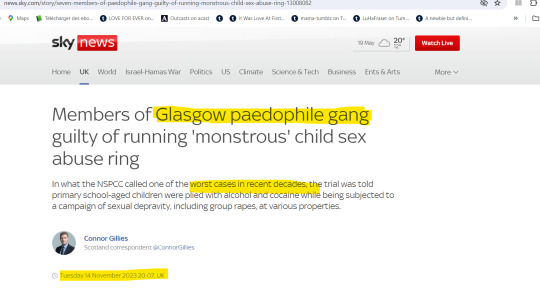
[Source: https://news.sky.com/story/seven-members-of-paedophile-gang-guilty-of-running-monstrous-child-sex-abuse-ring-13008082 - you read the article if you want, it's brutal]
I am not saying this will happen. What I am trying to say is simply that nobody (and I repeat: nobody) should play with fire, like this. Neither the parent, nor the public. This is a plea for decency across the dashboard I strongly felt I should make, if others won't.
No shitshow, no fantasy, no obsession should ever put a child's life at potential risk like that. You see, children are rarely asked if they would like to be shown off as circus monkeys.
91 notes
·
View notes
Text
Maintenance
Chuuya x Reader
Sensitive topics heavily implied!!!

As a member of the port Mafia, you were no stranger to loosing friends, comrades, though it was usually a result of the job.
In your personal life though... yeah, it was pretty much the same situation, with a few tweaked details.
You've always had a hard time making friends, and keeping them. You always assume its your fault.
It could be a number of other things. Poor choice in friends, you not doing enough to keep the friendship going, them not doing enough to keep the friendship going, drifting apart, personalities that just don't mesh, among other things of the sort.
Even when you find all these reasons, you still arrive to the same conclusion. It's all your fault.
But, you found a solution, a way to stop your friends from leaving you.
Over the years, you found that acts of service help. Doing things for these people, agreeing with these people, letting them dump their emotional baggage on you, buying things for them (even when you weren't in a good enough financial situation for it)
Ultimately, you found, the only way you could keep your friends around was to do whatever they wanted you to.
If only you hadn't been so wrong.
When Chuuya first joined the Mafia, he didn't know you, and you didn't know him. You were just some other underling, you worked for so and so doing such and such, he'd only occasionally pass you in the hallway.
Still, he had the biggest crush on you. You were just so beautiful, to pretty, so sweet. You seemed out of place in the Mafia headquarters.
The more he thought about you, the more you started appearing. Like that strange phenomenon when you first notice someone, and then suddenly you see them everywhere.
He wasn't complaining.
He saw how you were with some of your comrades, woman and men, you were always running around, doing things for them, following them wherever they wanted you to go. He didn't think much of it until he got brave enough to approach you and the group of 'friends' you had made a few years later.
"Ah, damn, I don't have enough for lunch! And I was really craving a pizza today too!" One of the woman whined, that's when you perked up, meekly raising your hand, as though you needed permission to speak, their attention went to you.
"I-i could always go and get you something if you like? I have enough on me"
That was nice of you.
"Really?! That would be great! Seriously, your such a life saver YN" she accepted your offer and praised you. And you ate it up with a bright smile and ran off to god knows where.
Once you were out of earshot, he heard the woman snicker
"See, if you want her to do anything, just make her feel bad for you! Pretend your injured, or sick, or that you have no money! Hell, she'll do anything if you so much as say you've had a bad day"
Chuuya froze. What? It was like some teen drama show - the overly kind, energetic friendly girl being taken advantage of by the meaner more callous popular one (Not that she was popular, Chuuya didn't even know her name, nor did he want to)
Well, if that's what it was gonna be like- he'd just become your Knight in shining armor!
If only it was that easy.
You'd come back rather quickly, almost like you'd ran, and handed the food over, the group thanking you, patting your head like dog before they up and left you standing there. You didn't have anything. Left on your own to go hungry for the day because you spent what you had on someone else.
So chuuya introduced himself. And he took you out to lunch.
It was the start of what should have been a beautiful friendship. But you were incredibly dense, and you treated chuuya the same way you treated everyone else, albeit with more effort because he never asked for anything.
And that made you nervous. You didn't know what you could do for him. So you did everything, to the point that everyone knew, and you eventually got assigned to become his 'secretary' of sorts. His personal lackey. Why bother giving anyone else the position when you were there doing it all anyway?
And Chuuya HATED this arrangement. But he couldn't say anything, not when you looked so happy to be working with him.
It takes a few more years before he's ready to tell you that he has feelings for you. He doesn't know what's been stopping him. Perhaps he was worried you didn't feel the same. He wouldn't put it past you to agree to date someone just because they asked, because you felt like you had to.
But then - then you got a boyfriend. Some guy he didn't know, and didn't really want to know.
You'd talk Chuuya's ear off about this man all day long, not singing his praise, but... complaining? It was refreshing, to see you not speaking so highly of someone, but it was also concerning as to the state of your relationship.
Your boyfriend disregarded your feelings, ignored what you said. But you'd tell Chuuya it was okay, because sometimes he just 'forgot'. He never spent much money on you either, which was fine, you didn't expect it. But chuuya distinctly remembers one day in the office watching you pace back and forth because you didn't have enough money for your boyfriends birthday gift - he'd been asking for it for months now, and you couldn't afford it.
Of course chuuya gave you the money for it. And of course you paid him back when he asked you not too.
After a few months Chuuya told you that you had to break up with him, for your own good. But you refused.
"You have no right to tell me that"
He didn't see you much after that. It broke his heart.
But not as much as it did weeks later when you came crying to him in his office. It was about your boyfriend - ex boyfriend now.
Chuuya once spoke about the future with you, where you saw yourself- married? Kids? You said you never wanted kids.
But now you come to him, a small white stick in your hand and tears running down your face. He sits you down and asked what happend.
"H-he didn't want to use... he didn't want to use protection. I asked him too, but he said it felt better without it. He said he'd leave me. So I - I let him..." Chuuya understood what you were saying, and it made his blood boil, he was ready to comitt murder in your name. But then you said something else that worried him.
"Then I..." You couldn't finish the sentence as you handed him the stick you came in with. Chuuya wasn't stupid. He knew what this was. It was the last thing you wanted.
"What are you going to do?" He finally asked.
You didn't answer him, instead leaning and resting your head on his shoulder.
You were tired. So he would let you sleep.
You left after a few hours, and came back a week later. A happy go lucky smile on your face as you ran around doing all the tasks you needed to do plus a few extras on the side. You weren't all there of course, smile faltering ever so slightly when you thought no one was looking. When no one would notice.
But Chuuya noticed. Of course he did. He was always looking. He always has been.
He let's you settle back into life, before he even considers thinking about you romantically again. He's cautious, he doesn't want to hurt you.
But eventually it gets too much. Your acts of service, you keep buying him things. It's too much! He should be the one doing that for you. And he tells you as much.
"But why? That's not... you job?" You asked him.
"It's not yours either"
You think you understand, and you panic - have you been doing too much all this time? You thought that was how friendships were supposed to work.
"You don't... you don't need to keep doing things for me. I want to be the one doing things for you!" He exclaimed, infront of many onlookers. "I want to be the one spoiling you, buying you presents, taking you out to eat, be someone you can lean on, talk to, tell all your problems" he continued further.
"I want to hold your hand. I want to see your face every day, I want to be close to you, and I want you to stop thinking you have to do things for me because you don't have to do anything other than be yourself"
"I didn't fall in love with what you could do for me, I didn't fall in love with the material items you brought me, I just fell in love with you, everything else be damned"
"You...fell in love with me?"
"Of course I did. How could I not"
"Well... i could think of one or two reasons" you tried to joke
"Just shut up. You have no idea how much it hurt, how much I hated myself for not being able to stop others from using you, how much it felt like I was also using you. And I don't want to use you, I just want to be with you... that's all"
"I..." You couldn't hide the shy grin coming to your face. It was out of character for Chuuya, especially infront of so many people to say such things, it was also cheesy. But... it meant to world to you. Chuuya loved you. And a part of you, the part of you you had been trying for so long to push down loved him too.
"You said you love me..." You whispered "you really said you love me!" You said a little louder
"I mean... well... yea, I guess I did"
You couldn't stop yourself from rushing forward to hug him, hiding your face in his shoulder
"You have... no idea how happy that makes me"
"I'd like to tell you how much i love you every day... if you'll let me?"
~~~~~~~~~~~~~~~~~~~~~~~~~~~~
Ehhhh, the endings not really doing it for me I'm afraid. I wanted so badly to write a bad ending, but that wouldn't have been very comforting.
Not that Chuuya did a whole lot of comforting until the end... sorta.
Masterlist :3
#bsd chuuya#imagine#fanfic#bungou stray dogs#x reader#anime#chuuya x reader#chuuya nakahara#chuuya nakahara x reader
66 notes
·
View notes